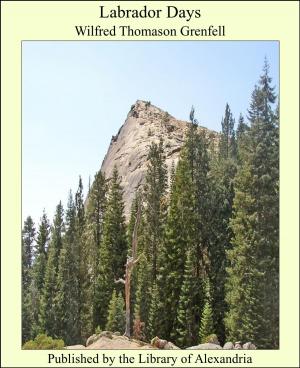It was a Lover and his Lass
Nonfiction, Religion & Spirituality, New Age, History, Fiction & Literature| Author: | Margaret Oliphant Wilson Oliphant | ISBN: | 9781465616036 |
| Publisher: | Library of Alexandria | Publication: | March 8, 2015 |
| Imprint: | Language: | English |
| Author: | Margaret Oliphant Wilson Oliphant |
| ISBN: | 9781465616036 |
| Publisher: | Library of Alexandria |
| Publication: | March 8, 2015 |
| Imprint: | |
| Language: | English |
There stands in one of the northern counties of Scotland, in the midst of a wild and wooded landscape, with the background of a fine range of hills, and in the vicinity of a noble trout-stream, a great palace, uninhabited and unfinished. It is of the French-Scottish style of architecture, but more French than Scotch—a little Louvre planted in the midst of a great park and fine woods, by which, could a traveller pass, as in the days of Mr. G. P. R. James, on a summer evening when the sun had set, and find himself suddenly face-to-face with such an edifice amid such a solitude, the effect even upon the most hardened British tourist would be something extraordinary. There it stands, white and splendid, raising its turreted roofs, such a house as a prince might live in, which would accommodate dozens of guests, and for which scores of servants would be needful. But all naked, vacant, and silent, the glassless windows like empty sockets without eyes, the rooms all unfinished, grass growing on the broad steps that lead up to the great barricaded door, and weeds flourishing upon the approach. Round about it are avenues of an exotic splendour, like the building, tall araucarias of kin to nothing else that flourishes in Scotland, blue-green pines of a rare species, and around these, in long-drawn circles, lines of level green terraces, upon which you can walk for miles—terraces more fit for Versailles than for Murkley, where the grass is generally wet, and promenades of this kind not very practicable for the greater part of the year. The pines have taken hold of the soil, have thriven and flourished, the araucarias are unequalled in Great Britain. Nature and the landscape have assimilated them, and made them free of the country in which they are to stand for ages. But the house, being due to human-kind, cannot be thus assimilated. No kindly growth, naturalizes it, no softening of years makes it fit into its place. It is too big and imposing to be run over by honeysuckles and roses like a cottage; it stands like a ghost among all the paths that lead to its blocked-up door. The rows of melancholy openings where windows ought to be glare out in their emptiness, in contrast with that door which never opens, and makes all natural access to the place impossible. An army of tramps might clamber in at the windows, and make carnival in the vacant rooms, but the master of the house could not without an organized assault find admittance in the recognized way. At night, or when the evening glooms are falling, nothing can be more startling than to stray into the presence of this huge thing, which is not a habitation, and which seems, all complete yet so incomplete, to have strayed into regions quite uncongenial and out of sympathy with it, where it stands as much out of its element as a stranded boat.
There stands in one of the northern counties of Scotland, in the midst of a wild and wooded landscape, with the background of a fine range of hills, and in the vicinity of a noble trout-stream, a great palace, uninhabited and unfinished. It is of the French-Scottish style of architecture, but more French than Scotch—a little Louvre planted in the midst of a great park and fine woods, by which, could a traveller pass, as in the days of Mr. G. P. R. James, on a summer evening when the sun had set, and find himself suddenly face-to-face with such an edifice amid such a solitude, the effect even upon the most hardened British tourist would be something extraordinary. There it stands, white and splendid, raising its turreted roofs, such a house as a prince might live in, which would accommodate dozens of guests, and for which scores of servants would be needful. But all naked, vacant, and silent, the glassless windows like empty sockets without eyes, the rooms all unfinished, grass growing on the broad steps that lead up to the great barricaded door, and weeds flourishing upon the approach. Round about it are avenues of an exotic splendour, like the building, tall araucarias of kin to nothing else that flourishes in Scotland, blue-green pines of a rare species, and around these, in long-drawn circles, lines of level green terraces, upon which you can walk for miles—terraces more fit for Versailles than for Murkley, where the grass is generally wet, and promenades of this kind not very practicable for the greater part of the year. The pines have taken hold of the soil, have thriven and flourished, the araucarias are unequalled in Great Britain. Nature and the landscape have assimilated them, and made them free of the country in which they are to stand for ages. But the house, being due to human-kind, cannot be thus assimilated. No kindly growth, naturalizes it, no softening of years makes it fit into its place. It is too big and imposing to be run over by honeysuckles and roses like a cottage; it stands like a ghost among all the paths that lead to its blocked-up door. The rows of melancholy openings where windows ought to be glare out in their emptiness, in contrast with that door which never opens, and makes all natural access to the place impossible. An army of tramps might clamber in at the windows, and make carnival in the vacant rooms, but the master of the house could not without an organized assault find admittance in the recognized way. At night, or when the evening glooms are falling, nothing can be more startling than to stray into the presence of this huge thing, which is not a habitation, and which seems, all complete yet so incomplete, to have strayed into regions quite uncongenial and out of sympathy with it, where it stands as much out of its element as a stranded boat.















